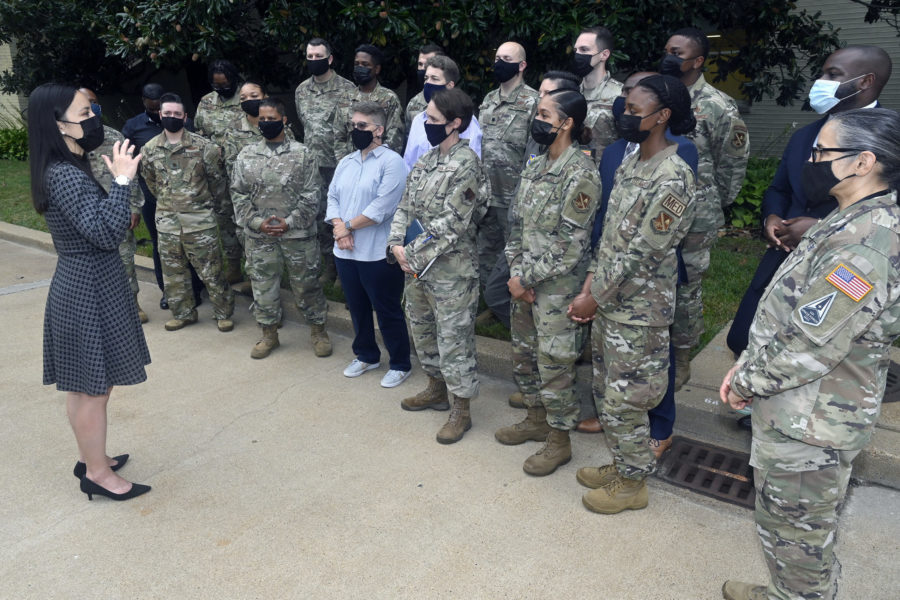Undersecretary of the Air Force Gina Ortiz Jones recently gathered service members in the Pentagon courtyard to take a photo commemorating the 10th anniversary of the repeal of “don’t ask, don’t tell,” but she was surprised by the age of those present: They did not seem old enough to have served under the policy that silenced gay service members.
“When I showed up, I was like, ‘Oh, some of these folks look pretty young,’” Ortiz Jones recounted during a panel on developing the next generation of Guardians and Airmen at the Air Force Association’s Air, Space & Cyber Conference in National Harbor, Md.
“My team told me, ‘Actually, the vast majority of these folks wanted to be part of this picture because … they joined because ‘don’t ask, don’t tell’ was repealed,” said Ortiz Jones, a member of the LGBTQ community who, in order to keep her Air Force ROTC scholarship, was forced to sign an agreement promising not to engage in homosexual behavior. On Active duty in the Air Force from 2003 to 2006, she deployed to Iraq as an intelligence officer and served under the policy.
Ortiz Jones told the story as an example of department policies that could be changed or modified to attract and retain diverse talent.
Ortiz Jones, along with panelists retired Gen. Edward A. Rice Jr., who served as commander of Air Education and Training Command from 2010 to 2013; Space Force Chief Human Capital Officer Patricia Mulcahy; and Lt. Gen. Brian T. Kelly, Department of the Air Force deputy chief of staff for manpower, personnel, and services, made the case that diversity and inclusion in recruiting, retention, and promotion are necessary to confront America’s adversaries.
“We need talent as diverse as the opportunities and challenges we face as a country,” Ortiz Jones said. “The threat, our ability to address that, is certainly based on the talent we have within our Space Force and our Air Force.”
Air Force leaders on Sept. 16 discussed the results of a racial and gender disparities survey released by the Air Force inspector general that found wide disparities in recruitment, retention, and promotions affecting women, Asian Americans, Native Americans, Latinos, and Pacific Islanders. The study followed a December review that had identified many of the same inequities for Black Airmen.
Kelly expanded on the idea of inclusiveness and dismissed claims that recent changes to physical fitness testing requirements lower female standards in the interest of gender diversity.
“We’ve done the work, we’ve had a scientific team come in and help us work through that,” he said of the new options the Air Force is offering as options to replace sit ups and a mile-and-a-half run.
As to new allowances for women to wear their hair in ponytails, braids, and down, Kelly made a joke about China’s People’s Liberation Army.
“As if there’s some generals over in the PLA who are going, ‘We’ve got ‘em now, they’re letting their women wear their hair down,” he said.
“What they’re probably more … excited about is if we have policies that do not allow us to maximize our potential, right? Do not allow us to maximize the talent that we can bring in,” he said. “The power and strength of America is our diversity.”
Mulcahy said the gender gap in the Space Force is among the largest in the services, with just 19 percent women.
“We see this as an issue in the Space Force,” she said, noting the Space Force will recruit far fewer Guardians than the Air Force will Airmen, some 400 compared to the 27,000 the Air Force will intake. “So, we should be approaching things a little bit differently.”
Mulcahy called for the Space Force to take a closer look at medical exemptions and other potential policy changes.
“We, being as small as we are, could take a look at making use of those policies and granting exceptions,” she said.
Kelly brought the argument about diversity back to making the force stronger:
“If we were less inclusive and less diverse, and that led to us being a less talented Air Force, then I do think there are generals in the PLA who are celebrating going, ‘Good, let them operate that way.’”
